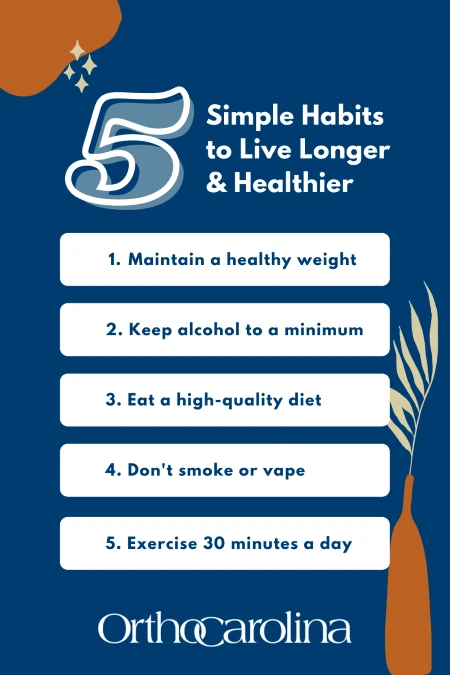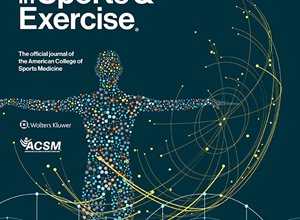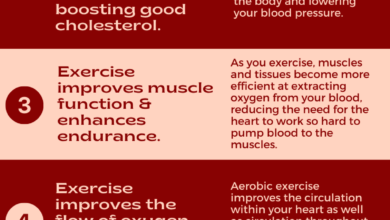
How to Live Longer Healthy: Tips for a Vibrant Life
Living longer and staying healthy is a goal for many. A few simple habits can make a big difference.
Living longer and staying healthy is a goal for many. A few simple habits can make a big difference.
Good health is more than just avoiding illness. It’s about feeling good and enjoying life. Many factors influence our health and how long we live. Diet, exercise, sleep, and stress management all play key roles. Making small changes can lead to big benefits.
Understanding these factors can help you make better choices. This blog will guide you through practical steps to improve your health and extend your life. Let’s explore how to live longer and stay healthy with easy-to-follow tips.
Balanced Diet
Maintaining a balanced diet is key to living a longer, healthier life. It not only helps in managing weight but also ensures that your body gets the necessary nutrients to function optimally. A balanced diet includes a variety of foods in the right proportions. This ensures that you get the right amount of nutrients and energy to stay healthy. Below, we explore two crucial components of a balanced diet: nutrient-rich foods and portion control.
Nutrient-rich Foods
Consuming nutrient-rich foods is essential for your overall health. These foods provide vitamins, minerals, fiber, and other essential nutrients. Here are some examples:
- Fruits and Vegetables: Aim for a variety of colors and types. They are rich in vitamins and minerals.
- Whole Grains: Options like brown rice, oats, and whole wheat bread provide fiber and energy.
- Lean Proteins: Include sources like chicken, fish, beans, and nuts. These help in muscle repair and growth.
- Dairy: Choose low-fat or fat-free options. They are good sources of calcium and vitamin D.
Portion Control
Portion control is just as important as choosing the right foods. Eating too much, even of healthy foods, can lead to weight gain and other health issues. Here are some tips for managing portions:
- Use Smaller Plates: This can help you eat less by making portions look bigger.
- Read Labels: Check serving sizes on food packages. This helps you understand how much you are eating.
- Measure Portions: Use measuring cups or a food scale to ensure accurate portions.
- Eat Slowly: It takes time for your brain to signal that you are full. Eating slowly can help you eat less.
Here’s a simple table to help you visualize portion sizes:
| Food Type | Recommended Portion Size |
|---|---|
| Fruits and Vegetables | 1/2 plate |
| Whole Grains | 1/4 plate |
| Lean Proteins | 1/4 plate |
| Dairy | 1 cup |

Credit: www.orthocarolina.com
Regular Exercise
Regular exercise is essential for a healthy and long life. It helps maintain your body’s fitness and prevents various diseases. Incorporating different types of workouts can improve your overall well-being. Let’s explore two key components: cardiovascular workouts and strength training.
Cardiovascular Workouts
Cardiovascular workouts are crucial for a healthy heart. They help improve blood circulation and boost lung capacity. Examples include:
- Running – Great for burning calories and improving stamina.
- Swimming – A low-impact exercise that works the whole body.
- Cycling – Enhances leg strength while being easy on the joints.
These exercises can reduce the risk of heart disease. Aim for at least 150 minutes of moderate-intensity cardio each week.
Strength Training
Strength training is vital for maintaining muscle mass and bone density. It involves exercises that make your muscles work against a force. Examples include:
- Weight lifting – Builds muscle and increases metabolism.
- Bodyweight exercises – Such as push-ups and squats, which improve muscle tone.
- Resistance bands – A versatile tool for enhancing muscle strength.
Strength training helps in reducing the risk of osteoporosis. It also improves balance and coordination. Aim for at least two days of strength training per week.
Combining cardiovascular workouts and strength training can significantly enhance your health. It leads to a longer, healthier life.
Mental Wellness
Living a long and healthy life is not just about physical health. Mental wellness plays a crucial role too. Keeping your mind healthy can add years to your life. It can also improve your quality of life. Below, we explore important aspects of mental wellness.
Stress Management
Stress can shorten your lifespan. Learning to manage stress is important. Here are some effective techniques:
- Exercise regularly: Physical activity reduces stress hormones.
- Healthy diet: Eating well can improve your mood.
- Sleep: Get enough rest each night.
Creating a routine can help manage stress. Make time for hobbies and relaxation. Talk to a friend or a therapist if needed.
Mindfulness Practices
Mindfulness can improve mental wellness. It involves being present in the moment. Here are some simple practices:
- Breathing exercises: Focus on your breath.
- Body scan: Pay attention to different parts of your body.
- Meditation: Spend a few minutes each day meditating.
Mindfulness can reduce stress and anxiety. It can also improve focus and clarity. Try to incorporate mindfulness into your daily routine.

Credit: www.newscientist.com
Quality Sleep
Quality sleep plays a significant role in living a longer, healthier life. Good sleep boosts the immune system, improves mental health, and reduces the risk of chronic diseases. Let’s explore how you can achieve quality sleep and the benefits it offers.
Sleep Hygiene
Practicing proper sleep hygiene is crucial for quality sleep. Here are some tips:
- Consistent Schedule: Go to bed and wake up at the same time every day.
- Comfortable Environment: Ensure your bedroom is dark, quiet, and cool.
- Limit Screen Time: Avoid screens at least one hour before bedtime.
- Avoid Stimulants: Reduce caffeine and nicotine intake, especially in the evening.
- Relaxation Techniques: Practice meditation or deep breathing exercises before bed.
Optimal Sleep Duration
Getting the right amount of sleep is essential for good health. The optimal sleep duration varies by age:
| Age Group | Recommended Sleep Duration |
|---|---|
| Children (6-12 years) | 9-12 hours |
| Teens (13-18 years) | 8-10 hours |
| Adults (18-64 years) | 7-9 hours |
| Older Adults (65+ years) | 7-8 hours |
Adhering to these guidelines will help improve your overall health. It also enhances your daily performance and well-being. Aim to meet the recommended sleep duration for your age group. Doing so will help you live a longer, healthier life.
Hydration
Staying hydrated is vital for overall health and longevity. Water plays a key role in many bodily functions. It aids digestion, regulates temperature, and keeps joints lubricated. Drinking enough water daily helps maintain energy levels and promotes clear skin. Let’s dive into the importance of hydration and how to ensure you get enough.
Daily Water Intake
How much water should you drink each day? The general rule of thumb is eight 8-ounce glasses, which equals about 2 liters, or half a gallon. This is known as the 8×8 rule. But individual needs can vary based on activity level, climate, and health conditions. Listen to your body. Drink water when you feel thirsty. You can also monitor the color of your urine. Pale yellow is a good sign of proper hydration.
| Activity Level | Recommended Water Intake |
|---|---|
| Sedentary | 2 liters |
| Moderate Exercise | 2.5 liters |
| Intense Exercise | 3 liters or more |
Benefits Of Hydration
Hydration offers numerous benefits. Here are some key advantages:
- Improved Brain Function: Staying hydrated boosts cognitive performance and concentration.
- Better Digestion: Water helps break down food, making nutrients easier to absorb.
- Joint Health: Proper hydration keeps joints lubricated, reducing pain and discomfort.
- Detoxification: Water aids in flushing out toxins from the body, promoting kidney function.
- Temperature Regulation: Drinking water helps maintain a stable body temperature, especially in hot weather.
Incorporating more water into your daily routine is simple. Carry a reusable water bottle. Set reminders on your phone. Add flavor with slices of lemon or cucumber. These small changes can have a big impact on your health and longevity.
Social Connections
Social connections play a significant role in living a longer, healthier life. Maintaining relationships and engaging with the community can boost mental and physical well-being. Let’s explore how building relationships and community engagement can enrich your life.
Building Relationships
Creating and maintaining strong bonds with family and friends can enhance your longevity. These connections offer emotional support, reduce stress, and provide a sense of belonging.
Ways to build relationships:
- Stay in touch regularly: Call, text, or visit loved ones often.
- Share experiences: Engage in activities together, like hobbies or sports.
- Communicate openly: Share your thoughts and listen to others.
By focusing on these areas, you can strengthen your relationships and improve your overall well-being.
Community Engagement
Being involved in your community can provide numerous health benefits. It helps you stay active, meet new people, and develop a sense of purpose.
Ways to engage with your community:
- Volunteer: Offer your time to local organizations or causes.
- Join clubs or groups: Participate in activities that interest you.
- Attend local events: Go to community gatherings, fairs, or workshops.
Engaging with your community can make you feel more connected and improve your quality of life.
Preventive Healthcare
Preventive healthcare is key to living a longer, healthier life. It involves taking steps to avoid diseases before they occur. This approach saves you from pain, stress, and high medical costs. Let’s explore some important aspects of preventive healthcare.
Regular Check-ups
Regular check-ups are essential for early disease detection. Doctors can spot potential health issues before they become serious. They provide you with tailored advice. These visits help keep your health on track. Regular check-ups also ensure your body’s vital functions are working well. They include tests like blood pressure monitoring and cholesterol checks.
Vaccinations
Vaccinations protect you from many infectious diseases. They boost your immune system. Vaccines are safe and effective. They prevent illnesses like measles, flu, and hepatitis. Getting vaccinated reduces the spread of diseases. It also protects those around you, especially the vulnerable. Always stay updated with your vaccination schedule.
Healthy Habits
Healthy habits are essential for a long and vibrant life. By adopting certain practices, you can improve your health and increase your longevity. Small changes in your daily routine can make a big difference. Let’s explore some key habits that promote a healthier and longer life.
Avoiding Tobacco
Tobacco is a major cause of many health problems. It can lead to lung cancer, heart disease, and other serious conditions. Quitting tobacco can significantly improve your health. It lowers the risk of developing many diseases. Even if you have smoked for years, stopping now can still be beneficial. Seek help if needed. There are many resources available to support you in quitting.
Moderate Alcohol Consumption
Drinking too much alcohol can harm your health. It can cause liver damage, heart disease, and other issues. Consuming alcohol in moderation is key. For men, this means up to two drinks a day. For women, it means up to one drink a day. Choose drinks like wine in moderate amounts. It may offer some health benefits. Always be mindful of your alcohol intake.

Credit: www.health.harvard.edu
Frequently Asked Questions
What Are The Best Foods For Longevity?
Eating fruits, vegetables, whole grains, nuts, and lean proteins can boost longevity. These foods provide essential nutrients and antioxidants.
How Does Exercise Contribute To A Longer Life?
Regular exercise strengthens your heart, muscles, and bones. It also improves mental health and boosts your immune system.
Can Stress Management Help You Live Longer?
Yes, managing stress reduces the risk of chronic diseases. Techniques like meditation and deep breathing can be very effective.
How Important Is Sleep For Longevity?
Quality sleep is crucial for overall health. It helps repair your body and boosts your immune system.
Conclusion
Living longer and healthier is within your reach. Start by eating balanced meals. Exercise regularly to boost your heart health. Prioritize sleep for overall wellness. Stay hydrated to keep your body functioning well. Manage stress through relaxation techniques. Build strong social connections for mental well-being.
Avoid harmful habits like smoking. Routine check-ups can catch issues early. Small daily choices make a big difference. Embrace a healthy lifestyle today for a better tomorrow.





